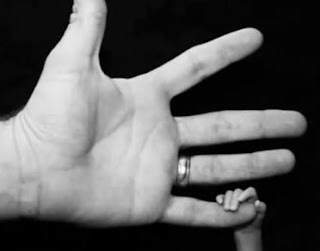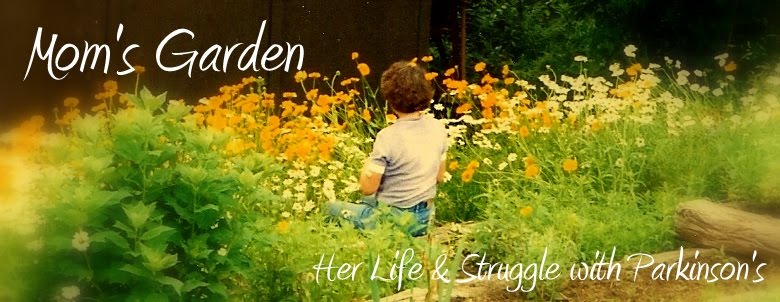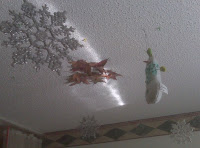 |
| Mom |
In the midst of the early morning phone call, I immediately set aside a block of time that same Saturday afternoon to speak with the young couple. The two of them had every reason to be concerned.
I also made the conscious decision to meet Rachel, then twenty-five weeks pregnant, and her husband, Marcus, in a less formal setting; another sterile, impersonal medical facility was surely the last place either of them wanted to be.
Rachel’s recent uterine sonogram had raised at least one red flag. The subsequent echocardiogram of their nascent son’s heart provided definitive evidence that all initial concerns had been warranted; their developing son was afflicted with one of the most complicated and challenging congenital cardiac anomalies, Hypoplastic Left Heart Syndrome. By contacting me, Rachel and Marcus had hoped I might better describe both the constellation of defects associated with the syndrome as well as outlining a general roadmap for eventual treatment if their son was fortunate enough to survive beyond delivery.
The beautiful young couple was joined by her cousin, a second year medical student who brought an armload of the very same Netter Atlases of Anatomy that will become familiar to Marcus when entering medical school next fall. From the outset, the three seemed realistically mindful of the troublesome ramifications of the diagnosis while also maintaining their youthful optimism and demonstrating the requisite determination to meet the challenge head on.
With our meeting completed, I remember leaving feeling buoyed by their obvious strength, genuine expressions of faith, confident in a wellspring of support from family and friends, and decidedly humbled by their remarkable maturity in the face of this great uncertainty.
Rachel and Marcus were girding themselves to deal with whatever might come.
Three days later, however, I received another sobering message from Marcus who informed me of Rachel's amniocentesis results. The test revealed that her unborn son was faced with an even more daunting diagnosis, Trisomy 18, otherwise known as "Edward's Syndrome."
The news came as an immediate shock to my senses; it was one of those moments of surprise that often has you sensing a wave of electricity passing along the length of your spine.
With the duplication of but one seemingly insignificant strand of DNA that might mirror even a fraction of the 18th chromosome, their child’s fate was all but sealed.
Fifty percent of those born with this syndrome die within a week of birth.
 |
| JLH |
And what of his little heart?
The walnut-sized muscle was beating.
Despite any of the outward signs of imperfection brought upon by the genetic syndrome, the young couple looked at their second son and immediately declared him to be "perfect."
After twenty minutes holding her swaddled boy, Rachel was informed his pulse was rapidly growing more faint. Not wanting to deprive Marcus of intimately sharing some of these precious moments, Rachel relinquished their son, Jax, to his father's anxious arms. The memory of this moment prompted Marcus to later write of, “the life he would never lead that flashed through his Daddy’s eyes.”
“The first fall; the first snowman; T-Ball; High School; curfews; sending him off to College; meeting his wife; holding his first child; helping him fix a leaky faucet … as well as about 14,000 hugs along the way.”
"My son. My beautiful son! I Love You! I will always love you!"
“I was weeping and crying … my body was fatigued from the stress I was feeling from the tension of crying so hard. I noticed through the wells of salty water on my eyelids that I had been dripping tears on Jax. If he couldn't see or hear, maybe Jax felt my love through those tears as they washed over his weak little body."
Forty-five minutes after bounding prematurely into this world, Jax's little heart finally gave out.
Marcus went on to also write,
“Our son was now where we could not follow. We had so desperately held on to him, prayed for him to stay with us, and anxiously fought against his leaving. On the other side of time his Creator, grandpa, and two great-grandparents were patiently waiting … Jax had come to do what he was created for. His part here on earth was now done. Our capacity to love expanded beyond measure, the value of mankind became ever clearer, and the love of God triumphed again. Jax’s heart beat for forty-five minutes, but for the rest of time when we think of Jax's life, we will also hear the whispers of God's good grace.”
Reflections of Jax and his family are now intertwined with thoughts of Mother as she moves ever closer to her final days.
What I wouldn’t give for the opportunity to ask our late grandmother of the joy and elation she felt when ushering Mom into her life. As expressed by Rachel and Marcus, did Grandmother also deem Mother to be a perfect baby girl?
What I wouldn’t give for the opportunity to ask our late grandmother of all the unrecorded moments of Mother’s young life. Just as Marcus wrote, are the images of that which was experienced and yet unseen by my eyes over the course of her younger life somehow less important to me now?
While certainly not challenged with the genetics that would dramatically foreshorten her life, Mother’s frail little body does conspire against her today no less so than his genome guaranteed, from the moment of conception, nothing more than a brief sojourn for him here on this earth.
I do understand that none is guaranteed even a single moment of this precious commodity we call “life.”
But even as I declare an acceptance of this reality, I also continue to struggle as I seek to find answers to a good many unanswerable questions:
Why would nature allow an innocent like Jax to be conceived with the burden of potent and insurmountable odds levied against him; why would a loving God craft this beautiful boy using an unsustainable genetic paradigm?
Why would nature allow innocents like Mother to suffer under the yoke of needlessly horrific medical burdens? Why would a loving God allow some to pass away without pain during their sleep while countless others are made to endure years of cruel, inglorious decline?
Our family has spent the past few years bearing witness to Mother's painfully incremental physical and mental demise; it is an experience I would wish upon no one. But even as I have watched her life slowly ebb over time, I also struggle with recent decisions that would have the family no longer allow for the treatment of “treatable” conditions in the days or weeks ahead.
Like Marcus, I, too, have tried desperately to cling to any hope that Mother might remain with us for a while longer; after learning of the fateful treatment decision, my immediate thought was that neither she nor her loved ones should be deprived of even a moment of shared time.
“Take Rachel and Marcus as an example,” arguing to myself many times over, “surely they would have moved heaven and earth for but one additional minute with their son, Jax!”
Ten days after learning of the difficult care decision for Mother, aided by the benefit of that time to reflect on my feelings, I am now equally convinced Rachel, Marcus and their surviving son, Jace, might also be quick to add:
You need to be thankful for the gift of time you have been allowed to share at your Mother’s side.
But your Mother suffers now, no less so than did Jax during the final few minutes of his all too brief life.
No matter the difference in time allotted to each of us with loved ones, might it also be selfish not to grant your Mother leave to wash away the burden of mortal suffering and to move on to the promise of higher ground?
Jax Lee Hennon. He lived, died, and offered valuable lessons within the span of but a single hour.
I will remain forever humbled by the dignity and courage exemplified by this young child and his loving family.
I also pray that when I am called upon one day to reflect on the life of our beautiful Mother, I, too, will be blessed with the guidance of the whispers of God’s good grace.
 |
| Marcus and JLH |























